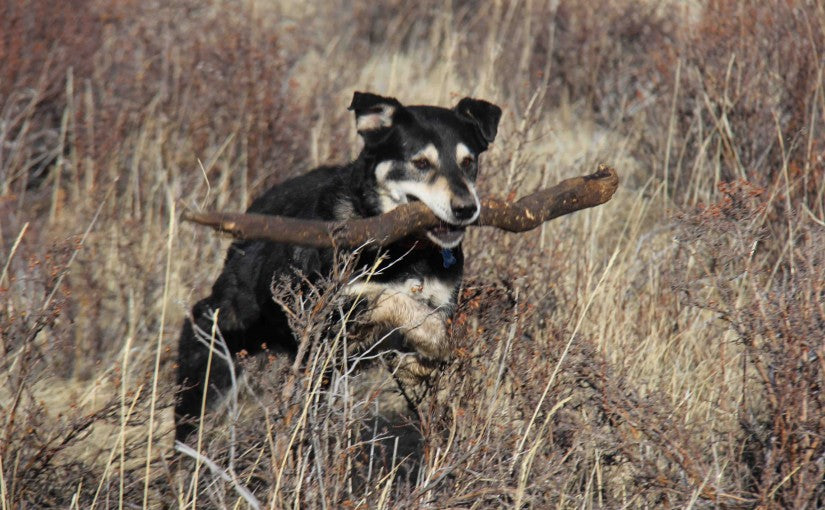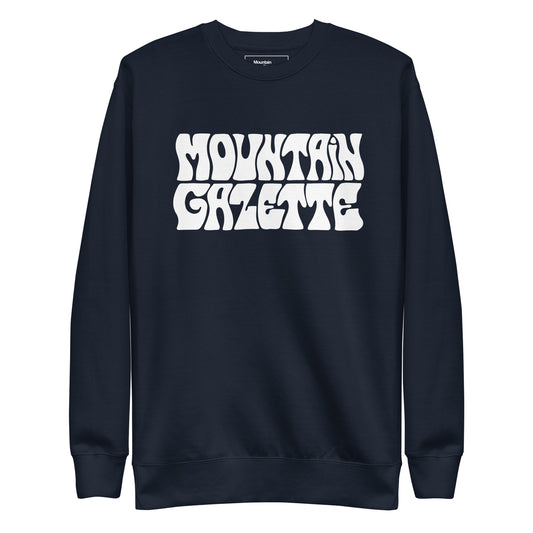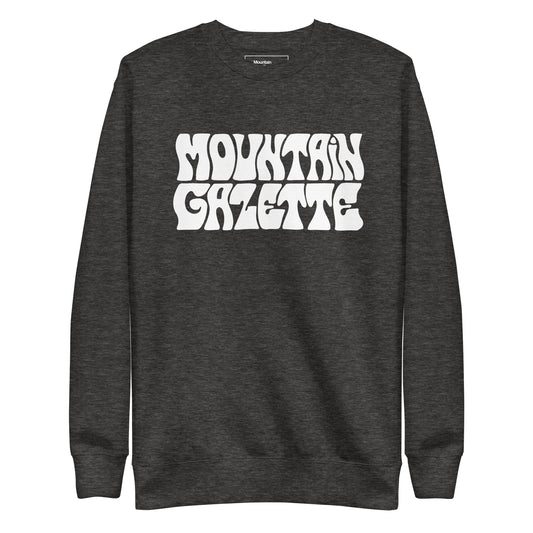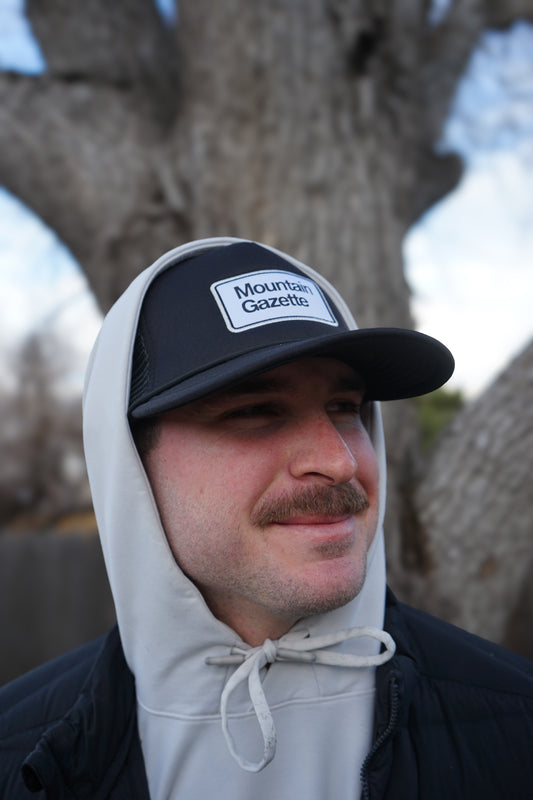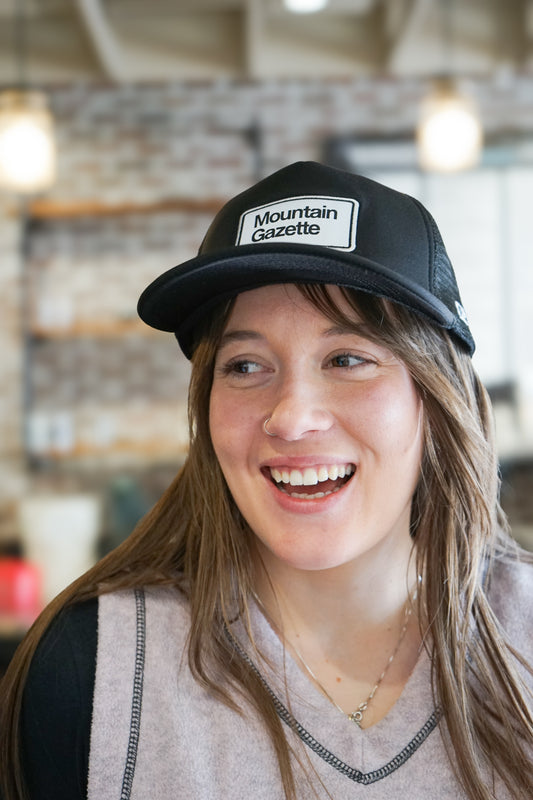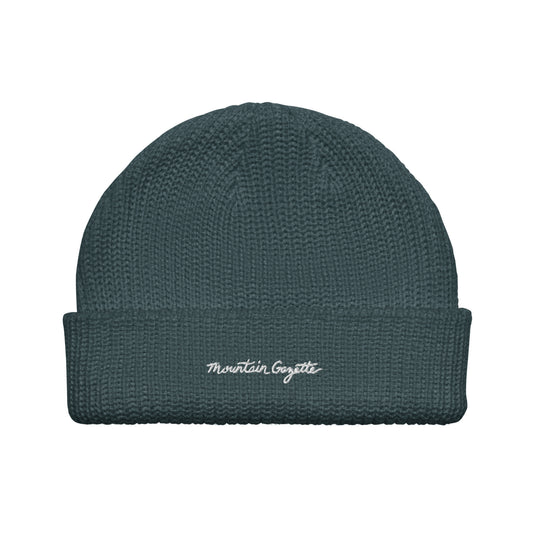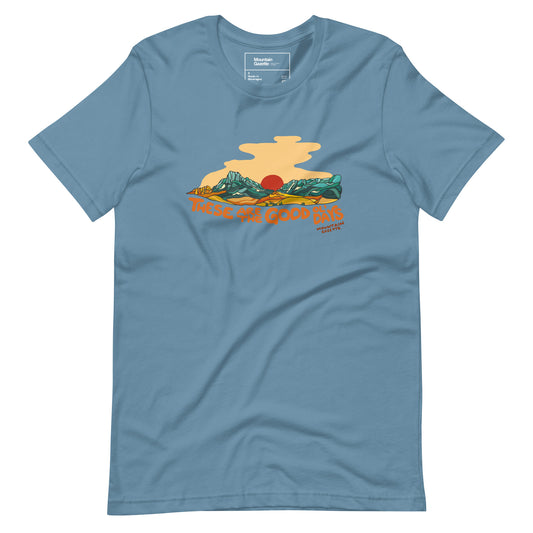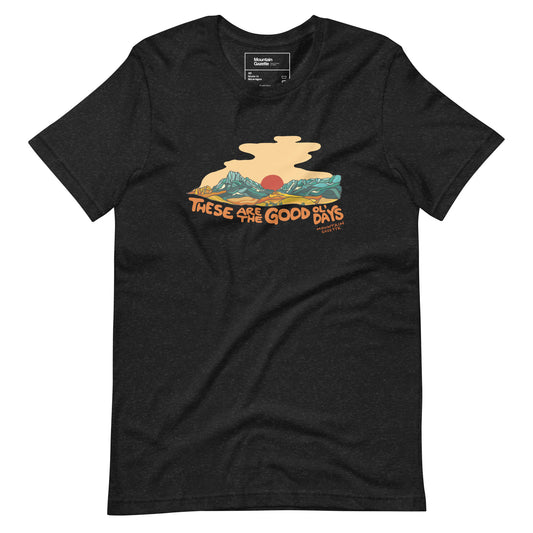By Jane Koerner
This piece originally ran on MountainGazette.com in 2015. We're republishing it here for readers of our Sunday Newsletter first.
Aging seems less daunting with Beast as my companion. We’re not aging gracefully as much as we’re adapting. After ten years of mountaineering together, we have to take our joints into consideration. Beast used to disappear without a trace. I would give him ten minutes to reappear. At 15 minutes, I would shout his name at the top of my lungs, cupping my hands around my mouth to amplify my calls over the wind. Eventually he would show up, a mostly black speck racing across the basin below or bounding from rock to rock down the mountainside opposite, a hurtling marvel of strength and coordination. I failed to appreciate the effort until he flopped at my feet, panting heavily, begging for an edible compliment.
Nowadays he stays in sight, looking back occasionally to gauge the distance between us, then waiting for me to catch up. This is his opportunity to squat and take a rest break. On the return trip, we stick so close together, I have to shove him aside with my knee occasionally so we don’t trip over one another and tumble down the mountainside together. He seems content with my Granny gait, as I lower myself down with a tight grip on my hiking poles and a cautious placement of each foot. He didn’t used to be this patient.
Our second summer of hiking together, he vanished as I was making my way down the interminable switchbacks to the parking lot. He was trotting along behind me, his progress interrupted by prey worthy of a chase or shrubs in need of his scent, and then he was gone. I shouted and shouted until I went hoarse. I finally heard him barking hundreds of feet below the trail, in dense scrub oak. I was still feeling the effects of the ascent in 90-degree-plus heat. Fearing he might have caught his collar on a branch, I abandoned my route for his.
Hours later, I arrived at the parking lot as the sun was setting, bloodied from shoulders to shins, my knees throbbing from the steep, gravely descent. I would never find him. He would die up there of dehydration or predation, trapped and invisible in the treacherous jungle. He was probably unconscious by now, or half-eaten to death. Weeping in despair, I knelt and reached behind the rear tire for my key.
A wet nose grazed my hand. Smart dog, I thought. Smarter than me. His shortcut worked out fine for him, and now he was cooling off in the shade while I opened the trunk so I could revive myself with the spare water bottle I always kept there.
I should have known that he had better route-finding skills as an adolescent than I did after 35 years of mountaineering. I found him in a latrine in April 2004. Opened the door, and there he was, poised to exploit this unexpected good fortune. A tour of the adjacent campground produced no owners, only a few theories. “He barked all night, tied up to that tree over there. Someone must have cut him free.” “No, he chewed his way out. Look at what’s left of that mangled rope around his neck.” The campground was within earshot of the highway. My theory: someone shut him up in the latrine so he wouldn’t get run over.
If he was grateful to be liberated, he didn’t show it. He wouldn’t come near me, but he was more than willing to follow me up the trail at a safe distance. Close enough to take advantage of the snacks that dribbled from my sandwich bag and mouth, yet far enough to elude capture. Back at the car, he watched me warily, retreating to the forest on the other side of the creek every time I tried to collar him. Two men in a pickup helped me catch him and wrestle him into the car. I couldn’t leave him behind. I was living in northern Utah at the time, where dogs are kept for hunting, not as a surrogate child-rearing experience. My neighbors caged them in the backyard and fed them scraps from the dinner table. When the number of pups in a litter exceeded the number of households available, the excess was dumped in the mountains. Spayed dogs were a rarity. The next hiker tempted to rescue him might treat him the same.
The vet said he was at least a year old. “A rock chewer,” he surmised after inspecting his mouth. How long he had been living in the mountains, I could only surmise. Was he an abandoned pup who managed to outwit the coyotes and mountain lions? A run-away? Or did he tumble out of the back of a pickup, a common occurrence, according to the vet. From my perspective, his chipped teeth demonstrated an impressive set of survival skills.
I named him Beast, hoping to transforming him into a Beauty once he was neutered and trained. The neutering didn’t make much difference. He still mounted every dog in sight. But he had made peace with my house. It was no longer a prison to be fled before I could drag him in, squirming and tugging in the opposite direction, but a restaurant that served two meals a day and a motel with a more comfortable mattress than his previous lodging in a cage or the underbrush.
For a dog that had interacted with few, if any, humans indoors, he was surprisingly trustworthy. The local newspaper dubbed him the Pied Piper of our town for his remarkable ability to lure children out of their yards without parents protesting. On walks to the park two blocks from my house, a growing chorus of “can we pet him? can we pet him?” trailed us to our destination. Then the fun began as the squealing abductees took their turn trying their luck at stroking and poking every conceivable body part. Not once did he bare his teeth or growl.
To this day, in town or on the trail, adults stop us to pose the same questions. “Has your dog had a stroke?” “Does your dog have epilepsy?” A reference to the tongue that dangles out the right side of his mouth. “No,” I patiently explain. “He was born that way. He’s missing a part of his jaw and his tongue sticks out whether he’s awake or asleep.”
Then a mystified look. “What kind of dog is he? He certainly isn’t a pedigree.”
“The first vet said husky-shepherd-lab. The second one said malamute-Australian-cattle-dog-lab.”
After numerous encounters of this nature, Beast’s routine is as refined as a burglar’s for breaking into a safe. He hypnotizes his target with his big brown unblinking eyes. Immobilized by his steadfast gaze, Target notices the tongue that swivels to the corner of Beast’s mouth, further contorting his lop-sided grin. “How adorable! What a cutey-pie!” No longer in command, his hands respond to Houdini’s every movement—from raised head to wagging behind. The head is patted, the butt rigorously scratched, relieving the incessant itching of Beast’s skin allergies. (“He’s the most allergic dog I’ve ever seen. He’s allergic to everything,” the vet said.) Treats are rewarded with a drooling grin. Target programmed for completion of Pavlovian experiment. Rolling over on his back, Beast spreads his legs and straightens his tail, exposing maximum square footage for a satisfying belly rub.
“It’s an insult to call him Beast,” my hiking companion, Babs, complained the fifth time he sucked her into his magnetic field for hours on end. She has never owned a pet, will never own a pet. Too much trouble.
“You should call him Bushwack,” my other hiking companion, Barb, said. A speed demon herself, she was jealous of his round-trip marathons up and down the mountain, three ascents for our one. He always makes the summit first. If we take an unintentional detour, he waits by the summit cairn until we correct our error. In his younger years he could bash his way through anything: willows so thick we wished for machetes, marshes the size of golf courses, piles of rock as mobile as a battalion on the march.
Beast’s inner beaver collected fallen aspens, which in transit became an unintentional crowd control device, clearing the trail of large hiking parties. Since losing a molar, a canine and half an incisor to unknown causes, he has downsized to sticks.
His husky genes proved indispensable on cross-country ski outings. Until the stiff hind legs and cloudy lenses of senior citizenship slowed him down, he could haul me, by his end of the leash, more than a mile uphill. As the most successful toy thief in my county, he has accumulated a yard full of pockmarked Frisbees, and deflated tennis balls, footballs and soccer balls to be deployed on behalf of his favorite game, Toss the Toy until Mistress Can’t Take It Anymore. Repeated thuds against the side of the house signal, “It’s time for the game to begin.”
At the first sign of fatigue—I’m human, after all—he switches balls, booting it with his nose into the air and perilously close to the patio door. This trick dates to the lessons in my backyard, when I rewarded him with dog biscuits for dribbling and bunting the soccer ball he found in my neighbor’s front yard.
Once he learns a trick, he never forgets it. I was teaching at a university, and every time I took him to campus, I had to keep him on a tight leash to prevent him from participating in the soccer and Frisbee matches on the Quad. Once, he snuck out of my building to snatch the Frisbee away from the final match of the university’s annual Frisbee tournament. Setting aside the intense rivalry of such a high-stakes match, both teams deserted their posts to give chase. The Pakistanis, whose soccer ball was redirected toward the net of their arch-rival, our graduate students from India, shook their fists as they pursued him. They were on the verge of scoring the winning goal. I apologized profusely as I handed them their slobber-soaked ball.
My next-door neighbor sent his son over to retrieve their missing toys. He accused me of stealing. “Why do you take our toys?” he asked, pointing at the pyramid of miniature plastic tables and chairs and delimbed dolls that Beast had arranged while no one was paying attention. That pyramid was located in the front yard next to the garbage can, as if Beast were taunting them. Toss the Toy balls stayed inside the garage, tucked away in the dog dish each night before bedtime—biggest, flattest ball on the bottom, smallest one on top.
I didn’t know what to say to the boy. “Don’t ask me,” I mumbled, pointing at the dog. “Ask him.”
When my students learned of my impending departure from the university, they grieved over the loss of their therapist. Twice a week he would walk with me to work and lounge in my office until it was time for class to start. Students with a history of skipping classes and little interest in the subject matter arrived early to play with him in the hallway and stayed the entire class period. On test days they would line up outside my office door, awaiting their appointment with Dr. Beast, whose undivided attention compensated for the absence of their beloved Fido at home. During class their canine psychologist would roam from student to student, offering unconditional affection, especially to those with acute performance anxiety. Classes routinely visited by him enjoyed higher rates of attendance and higher test scores on average.
Three years after my departure, former students still email to inquire about his health. They never ask about me. At age 12, my best estimate, Beast limps for days if he gets his way with Toss the Toy. After ten minutes I hide the football, then the Frisbee as he yips in frustration at my retreating heels. On hikes with friends, he still patrols the line, making certain the rabbit up front is not pulling too far ahead of the tortoise—at age 64, me. Last summer we had to adjust to recently diagnosed conditions: bone on bone in my right kneecap; arthritis in his hips, shoulders and knees. If we overdo it, I recline on the sofa afterward, icing my swollen knee while he snores like a locomotive at my feet. I have to shake him sometimes to wake him up. His eyes open, and in their mirrors I catch a glimpse of my tenderized face as I help him up.
No matter how our day goes, we follow the same routine at bedtime. I call him, keep calling him if need be, until a thunk announces his awkward exit from the living room chair. Like my sideways steps on staircases to spare my knee, he is accommodating the undeniable limitations of aging. I suspect his cataracts are worse than mine. Nuzzling my calf so he won’t lose me in the dim light, we slowly climb the stairs and shuffle down the carpeted hallway to the bedroom. He curls up on the cushion on the floor, his former nest on the bed out of reach now.
One of these days one of us might not wake up. The actuarial tables stack the odds in favor of my outliving him. But, as with so much of life—from marriage to job prospects to unforeseen accidents—it’s best to take nothing for granted. This realization has inspired another routine; before switching off the lamp on my nightstand, I listen to the lullaby of his snorts, sneezes and sighs, its melody steeped in eleven years’ worth of memories. Then it occurs to me; I should have named him Heart Thief.

